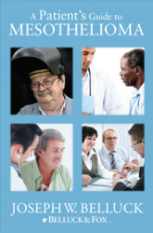
Mesothelioma Patients Stand to Benefit from FDA Approval of Keytruda as First Line Treatment for Melanoma
 The unprecedented results for mesothelioma and melanoma patients being treated with Keytruda (pembrolizumab) have kept the drug in the spotlight over the last year. The benefits of the drug are continuing to impress as the U.S. Food and Drug Administration announced last month that Keytruda is now approved for first-line treatment in melanoma patients.
The unprecedented results for mesothelioma and melanoma patients being treated with Keytruda (pembrolizumab) have kept the drug in the spotlight over the last year. The benefits of the drug are continuing to impress as the U.S. Food and Drug Administration announced last month that Keytruda is now approved for first-line treatment in melanoma patients.
FDA granted this approval after two new clinical trials verified the clinical benefit of pembrolizumab. In a Phase 3 trial, patients with unresectable or metastatic melanoma who were treated with Keytruda experienced “superior overall survival” compared to those treated with ipilimumab, reports Merck.
Keytruda, an immunotherapy drug from Merck that awakens the immune system to effectively fight off cancer cells, was previously approved for use in melanoma and lung cancer patients after a prior round of chemotherapy failed to stop progression of the disease. Keytruda works by targeting the cellular pathway known as PD-1/PD-L1 (proteins found on the body’s immune cells and some cancer cells).
“As recently as five years ago, there were few treatment options for patients suffering from advanced melanoma,” said Dr. Roger M. Perlmutter, president, Merck Research Laboratories, in a Dec. 18 press release announcing the news. “Today’s news is another exciting milestone for KEYTRUDA and for patients with this disease.”
The drug recently gained popularity when former U.S. president Jimmy Carter announced the drug sent his melanoma into remission.
However, researchers from Yale who conducted a recent study, report lung cancer patients may also benefit from early dosing of Keytruda. According to a Dec. 19 Yale press release, patients who expressed the PD-L1 biomarker “benefitted significantly” when treated with Keytruda. Patients who expressed the highest amounts of PD-L1 “responded better and lived, on average, twice as long as patients treated with docetaxel alone,” according to the study.
“I believe we should treat patients with the best available drugs as soon as possible. Now that we have learned which patients are most likely to benefit from the anti-PD-L1 strategy, we could begin moving this drug to the earlier setting stages,” said senior author Roy S. Herbst, M.D., the Ensign Professor of Medicine and chief of medical oncology at Yale Cancer Center and Smilow Cancer Hospital at Yale-New Haven.
Keytruda has brought new hope to the mesothelioma community with two prominent mesothelioma warriors showing excellent results from use of the drug. Mavis Nye of England, who has been participating in a clinical trial for the drug for nearly two years, was told in November that her formerly life-threatening mesothelioma tumors are now dormant.
Lou Williams of Australia, a 13 year mesothelioma survivor, has received 14 treatments of Keytruda, and will continue on it indefinitely. She told Mesothelioma Counsel, “Keytruda has given me back my life, as my body was literally shutting down. I am now once again living my life with quality, strength and determination.”
“This is a fascinating development in cancer treatment that uses targeted immunotherapy instead of standard chemotherapy,” noted Dr. Len Horovitz, a pulmonary specialist at Lenox Hill Hospital in New York City, according to a Dec. 19 Healthday article.

 Mike is a licensed attorney and the former editor of North Carolina Lawyers Weekly and South Carolina Lawyers Weekly. He has contributed numerous articles to the North Carolina State Bar Journal and is a co-author of Capital Lawyers, a history of the Wake County (NC) Bar.
Mike is a licensed attorney and the former editor of North Carolina Lawyers Weekly and South Carolina Lawyers Weekly. He has contributed numerous articles to the North Carolina State Bar Journal and is a co-author of Capital Lawyers, a history of the Wake County (NC) Bar.
 Gregory Froom is a licensed North Carolina attorney and the former editor of North Carolina Lawyers Weekly and South Carolina Lawyers Weekly.
Gregory Froom is a licensed North Carolina attorney and the former editor of North Carolina Lawyers Weekly and South Carolina Lawyers Weekly.
Leave a Reply